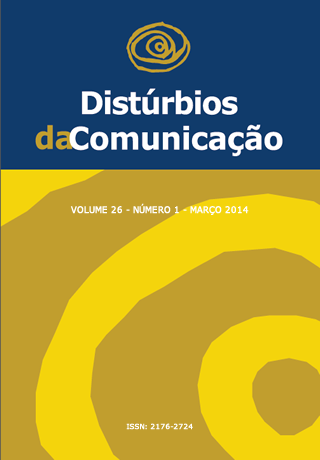O uso do P300 com estímulo de fala para monitoramento do treinamento auditivo
Palavras-chave:
perda auditiva central, potencial evocado P300, assistência à saúde.Resumo
Introdução: Uma vez confirmado o diagnóstico do Transtorno do Processamento Auditivo torna-se necessária realização do treinamento auditivo, para trabalhar as habilidades auditivas que se encontram alteradas. O fundamento chave para o treinamento auditivo está embasado na plasticidade neuronal e nas mudanças benéficas no comportamento auditivo e no sistema nervoso auditivo central. Tais mudanças podem ser monitoradas por meio de testes eletrofisiológicos, como o potencial cognitivo P300. Objetivo: Avaliar a efetividade do treinamento auditivo em crianças com o diagnóstico de transtorno do processamento auditivo, por meio do P300 com estímulo de fala. Métodos: Realizada a avaliação do P300 em 10 indivíduos, com idades entre sete e 14 anos, de ambos os gêneros, antes e após o treinamento auditivo. O programa de intervenção foi composto por nove sessões individuais. Todos os participantes foram submetidos ao P300 com estímulos acústicos binaurais (sílabas – BA e GA) e intensidade de 75 dB NA. Foram utilizados 500 estímulos, dentre os quais 80% foram frequentes (sílaba BA) e 20% foram raros (sílaba GA). Os estímulos raros e frequentes foram apresentados de forma aleatória (paradigma oddball). Resultados: Foi observada redução da latência e aumento da amplitude do P300 no instante pós-treinamento auditivo, de forma estatisticamente significante. Conclusão: Considerando as mudanças verificadas em relação à latência e amplitude do P300, eliciado com estímulo de fala após o programa terapêutico proposto, é possível concluir que este teste eletrofisiológico é uma ferramenta objetiva sensível para monitorar a efetividade do treinamento auditivo.
Downloads
Métricas
Downloads
Publicado
Edição
Seção
Licença
Copyright (c) 2014 Erika Gonçalves Francelino, Camila Fernanda de Castro Reis, Tatiana Melo

Este trabalho está licenciado sob uma licença Creative Commons Attribution 4.0 International License.









